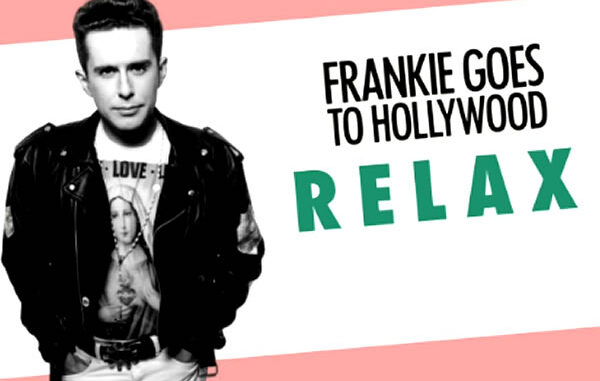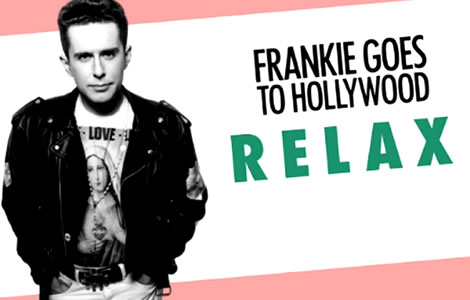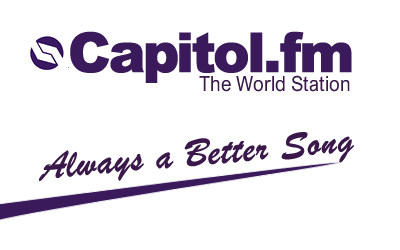
Frankie Goes to Hollywood’s debut single “Relax” became one of the most controversial and successful hits of the 1980s.

Released in 1983, it was banned by the BBC and stirred considerable public debate, yet it soared to the top of the UK charts, solidifying the band’s position as one of the most influential acts of the decade.
Background of Frankie Goes to Hollywood
Formed in Liverpool in 1980, Frankie Goes to Hollywood was comprised of lead vocalist Holly Johnson, guitarist Brian Nash, bass player Mark O’Toole, drummer Peter Gill, and backing vocalist Paul Rutherford. The band’s name was inspired by a headline in The New Yorker about Frank Sinatra’s Hollywood career.
They blended elements of new wave, synthpop, and dance music with a bold and flamboyant stage presence, which would come to define their music and public persona.
Before their rise to fame, the group struggled to gain attention but found success after performing on the Channel 4 music show The Tube. Their performance caught the eye of producer Trevor Horn, known for his innovative production style, who signed them to his label ZTT Records in 1983. Horn’s involvement was a key factor in transforming their raw sound into a polished, commercial product that would go on to captivate audiences.
Recording and Production of “Relax”
“Relax” was recorded with the vision of making a dance anthem that fused elements of electronic music with an aggressive, sensual energy. The song was produced by Trevor Horn, who employed cutting-edge technology and layered production techniques to create a sound that was both futuristic and accessible. Horn’s use of synthesizers, drum machines, and advanced studio effects set the tone for the track, which pulsed with a hypnotic bassline and soaring synthesizer riffs.
The recording process was meticulous, and Horn famously replaced much of the band’s original instrumentation with session musicians and electronic sounds. This approach was not uncommon for Horn, who prioritized a highly polished sound over the band’s raw input. Despite this, the final product captured the essence of Frankie Goes to Hollywood’s bold and provocative image.
The lyrics of “Relax,” written by Holly Johnson, were suggestive and packed with sexual innuendo. The line “When you want to come” was particularly striking, as it played on the double meaning of sexual release and relaxation. This overtly sexual content would soon become the centerpiece of the song’s controversy.
Meaning of “Relax”
At its core, “Relax” is a song about sexual freedom and release. Johnson has said that the song wasn’t initially intended to be overtly provocative, but its themes of desire, anticipation, and physical pleasure were clear. With lines like “Relax, don’t do it, when you want to come,” the song teetered between cheeky innuendo and outright expression of sexual liberation.
The lyrics encouraged listeners to embrace their desires and indulge in their fantasies, a message that resonated with the burgeoning LGBTQ+ community in the 1980s, especially as it was delivered by a flamboyant frontman like Holly Johnson.
Controversy and the BBC Ban
Despite its catchy melody and upbeat production, “Relax” was met with controversy due to its overtly sexual lyrics and suggestive promotional material.
When the song was first released in October 1983, it initially climbed the charts slowly. However, things took a dramatic turn in January 1984 when BBC Radio 1 DJ Mike Read publicly denounced the song during a live broadcast.
Declaring the lyrics “obscene,” Read refused to play the track on air, and shortly thereafter, the BBC officially banned “Relax” from being played on its radio and television outlets, including Top of the Pops, the UK’s most-watched music show.
Far from stalling the song’s success, the ban only fueled public interest. The controversy surrounding “Relax” turned it into a must-hear track, and within weeks, it had shot to the number one spot on the UK Singles Chart, where it remained for five weeks.
The ban only seemed to increase the song’s popularity, and it continued to sell briskly, eventually reaching global audiences. The single went on to sell over two million copies in the UK alone, making it one of the best-selling singles of all time.
Release and Aftermath
The official release of “Relax” in October 1983 marked the beginning of Frankie Goes to Hollywood’s meteoric rise to fame. Despite its initial slow progress on the charts, the song’s success was ignited by the BBC controversy in January 1984. After hitting number one, the track dominated radio playlists and club scenes across Europe and beyond.
Its infectious beat and rebellious message made it a dancefloor favorite, especially in the LGBTQ+ community, where its themes of sexual liberation resonated deeply.
Following the release of “Relax,” Frankie Goes to Hollywood continued to enjoy a string of hits. Their next two singles, “Two Tribes” and “The Power of Love,” also reached number one in the UK, making them the second act in history to achieve the feat of three consecutive number-one singles with their first three releases.
Their debut album Welcome to the Pleasuredome was released in late 1984 and solidified their place in pop culture. The album was a mix of original songs and covers, exploring themes of excess, power, and hedonism.
However, the band’s success was relatively short-lived. By 1987, internal tensions, creative differences, and a rapidly shifting music industry led to the group’s disbandment. Holly Johnson pursued a solo career, while other members went on to different projects, but none were able to recapture the success they had found with Frankie Goes to Hollywood.
Legacy of “Relax”
“Relax” remains one of the defining songs of the 1980s, a track that encapsulated the era’s mix of rebellion, sexual freedom, and technological innovation in music production.
Its ban by the BBC only added to its mystique and popularity, helping the song to become a global hit. Today, it is remembered not only for its infectious sound but also for its role in pushing the boundaries of what was considered acceptable in pop music at the time.
“Relax” remains a staple of 1980s nostalgia and continues to be played in clubs, on radio, and in pop culture references, ensuring its lasting legacy.
